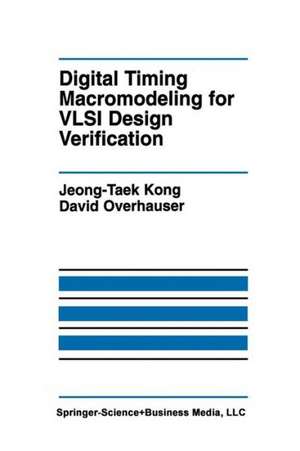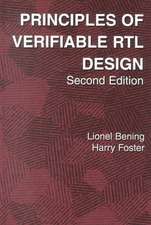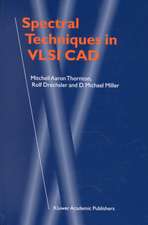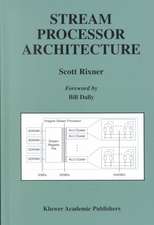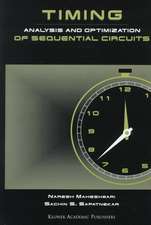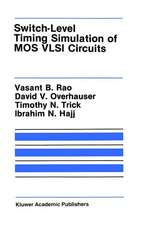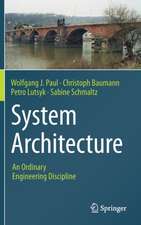Digital Timing Macromodeling for VLSI Design Verification: The Springer International Series in Engineering and Computer Science, cartea 319
Autor Jeong-Taek Kong, David V. Overhauseren Limba Engleză Paperback – 3 oct 2012
The book also presents a wide variety of techniques for performing nonlinear macromodeling of digital MOS subcircuits which address a large number of shortcomings in existing digital MOS macromodels. Specifically, the techniques address the device model detail, transistor coupling capacitance, effective channel length modulation, series transistor reduction, effective transconductance, input terminal dependence, gate parasitic capacitance, the body effect, the impact of parasitic RC-interconnects, and the effect of transmission gates. The techniques address major sources of errors in existing macromodeling techniques, which must be addressed if macromodeling is to be accepted in commercial CAD tools by chip designers. The techniques presented in Chapters 4-6 can be implemented in other macromodels, and are demonstrated using the macromodel presented in Chapter 3. The new techniques are validated over an extremely wide range of operating conditions: much wider than has been presented for previous macromodels, thus demonstrating the wide range of applicability of these techniques.
| Toate formatele și edițiile | Preț | Express |
|---|---|---|
| Paperback (1) | 944.36 lei 43-57 zile | |
| Springer Us – 3 oct 2012 | 944.36 lei 43-57 zile | |
| Hardback (1) | 949.23 lei 43-57 zile | |
| Springer Us – 31 mai 1995 | 949.23 lei 43-57 zile |
Din seria The Springer International Series in Engineering and Computer Science
- 24%
 Preț: 1041.98 lei
Preț: 1041.98 lei - 20%
 Preț: 643.50 lei
Preț: 643.50 lei - 18%
 Preț: 1225.62 lei
Preț: 1225.62 lei - 18%
 Preț: 965.02 lei
Preț: 965.02 lei - 20%
 Preț: 646.12 lei
Preț: 646.12 lei - 18%
 Preț: 948.79 lei
Preț: 948.79 lei - 20%
 Preț: 646.62 lei
Preț: 646.62 lei - 15%
 Preț: 637.46 lei
Preț: 637.46 lei - 20%
 Preț: 643.83 lei
Preț: 643.83 lei - 18%
 Preț: 949.23 lei
Preț: 949.23 lei - 20%
 Preț: 644.48 lei
Preț: 644.48 lei - 20%
 Preț: 994.92 lei
Preț: 994.92 lei - 20%
 Preț: 645.97 lei
Preț: 645.97 lei - 18%
 Preț: 946.87 lei
Preț: 946.87 lei - 20%
 Preț: 995.57 lei
Preț: 995.57 lei - 18%
 Preț: 956.99 lei
Preț: 956.99 lei - 20%
 Preț: 644.98 lei
Preț: 644.98 lei - 15%
 Preț: 649.54 lei
Preț: 649.54 lei - 18%
 Preț: 950.21 lei
Preț: 950.21 lei - 18%
 Preț: 1221.38 lei
Preț: 1221.38 lei - 18%
 Preț: 957.62 lei
Preț: 957.62 lei - 15%
 Preț: 643.99 lei
Preț: 643.99 lei - 18%
 Preț: 948.47 lei
Preț: 948.47 lei - 18%
 Preț: 947.35 lei
Preț: 947.35 lei - 20%
 Preț: 1284.65 lei
Preț: 1284.65 lei - 20%
 Preț: 1628.31 lei
Preț: 1628.31 lei - 20%
 Preț: 1285.78 lei
Preț: 1285.78 lei
Preț: 944.36 lei
Preț vechi: 1151.66 lei
-18% Nou
Puncte Express: 1417
Preț estimativ în valută:
180.76€ • 196.41$ • 151.94£
180.76€ • 196.41$ • 151.94£
Carte tipărită la comandă
Livrare economică 21 aprilie-05 mai
Preluare comenzi: 021 569.72.76
Specificații
ISBN-13: 9781461359821
ISBN-10: 1461359821
Pagini: 292
Ilustrații: XXI, 265 p.
Dimensiuni: 155 x 235 x 15 mm
Greutate: 0.41 kg
Ediția:Softcover reprint of the original 1st ed. 1995
Editura: Springer Us
Colecția Springer
Seria The Springer International Series in Engineering and Computer Science
Locul publicării:New York, NY, United States
ISBN-10: 1461359821
Pagini: 292
Ilustrații: XXI, 265 p.
Dimensiuni: 155 x 235 x 15 mm
Greutate: 0.41 kg
Ediția:Softcover reprint of the original 1st ed. 1995
Editura: Springer Us
Colecția Springer
Seria The Springer International Series in Engineering and Computer Science
Locul publicării:New York, NY, United States
Public țintă
ResearchCuprins
1 Introduction.- 1.1 Overview of the VLSI Design and Verification Process.- 1.2 Problems in MOS Digital Macromodeling.- 1.3 Contributions of The New Macromodel.- 2 Survey of Simulation and Macromodeling Techniques.- 2.1 Introduction.- 2.2 Circuit Simulation.- 2.3 Macromodeling.- 2.4 Gate-level and Switch-level Simulation.- 2.5 Switch-level Timing Simulation.- 2.6 Fast-timing Simulation.- 2.7 Interconnection Analysis.- 2.8 Mixed-mode/Mixed-domain Simulation.- 3 A Nonlinear Macromodel.- 3.1 Introduction.- 3.2 A Macromodel for the General Case.- 3.3 Macromodeling with Fast Input Transitions.- 3.4 Slow Input and Fast Output Transitions.- 3.5 Experimental Results.- 4 Reduction Techniques for Complex Gates.- 4.1 Introduction.- 4.2 Reduction of Series-connected Transistors.- 4.3 Generalized Reduction Techniques for Complex Gates.- 4.4 Experimental Results.- 5 Accounting for RC-Interconnects.- 5.1 Introduction.- 5.2 Related Work.- 5.3 RC-interconnect Effects.- 5.4 Modeling the Effective Driver-loading.- 5.5 Driver Output Waveform Estimation.- 5.6 Experimental Results.- 6 Transmission Gate Modeling.- 6.1 Introduction.- 6.2 A Gate Driving a Transmission Gate.- 7 Conclusions.- 7.1 Summary.- 7.2 Future Research.- A The Spice Level 2 Model.- B Nonlinear Macromodel Output Response Derivations.- B.1 The Derivation of the Output Response in Region III.- B.2 The Derivation of the Output Response in Region VI.- D Delay Errors for Various AOI Gates.- References.
